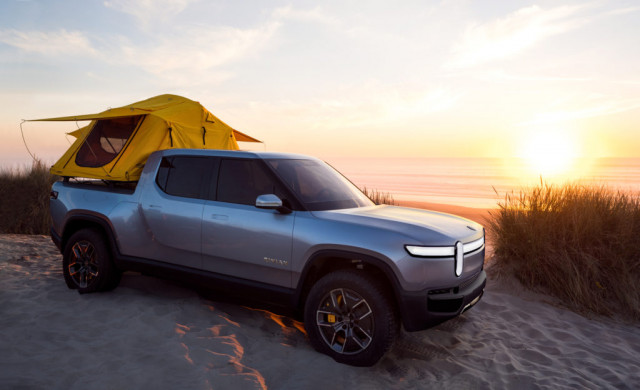
Rivian R1T electric pickup concept
If electric cars are going to take over from internal combustion machines, they will need to be offered in the most popular types of vehicles—and that means pickups.
Electric-car fans seem to be clamoring for electric pickups, and some startup automakers—along with Tesla—are starting to respond.
READ THIS: Rivian R1T all-electric pickup revealed: 400-mile range, 160-kw DC fast charging
At November's LA auto show, Michigan-based startup Rivian showed a concept version of its R1T electric pickup, which it says it plans to sell starting in 2021.
Tesla CEO Elon Musk has said the company plans to design an electric pickup to follow its Model Y SUV, which was originally scheduled to go on sale in 2019. With production of the Model 3 just getting into full swing, though the company hasn't mentioned a start date for the Model Y recently.

Bollinger B2
Ford has confirmed it plans to build a hybrid version of its F-150 starting in 2020, and, speaking in October at the 100th anniversary of Ford's giant Rouge factory, chairman Bill Ford hinted that the company will eventually build an all-electric F-150 "when the time comes."
CHECK OUT: Bollinger Motors announces B2 electric pickup alongside SUV
New York startup Bollinger Motors, which has shown a concept version of a heavy-duty SUV it plans to build, also showed a pickup design in October. Like Bollinger's SUVs, it would be a heavy-duty pickup, likely a one-ton, so heavier than most personal-use pickups, but designed more for off-roaders, hunters, or campers, rather than contractors. The company did not release a timeline.
With all these electric pickups in the works, we thought we'd ask our followers which one they think might arrive on the market first. Our official Twitter poll this week asks: "Which company will sell the first personal-use electric pickup?"
Those are the choices: Rivian, Tesla, Ford, or Bollinger.
Click on over to the poll to let us know which electric pickup you're most optimistic about. And remember that our Twitter polls are unscientific, because of low sample size and because our respondents are self-selected.